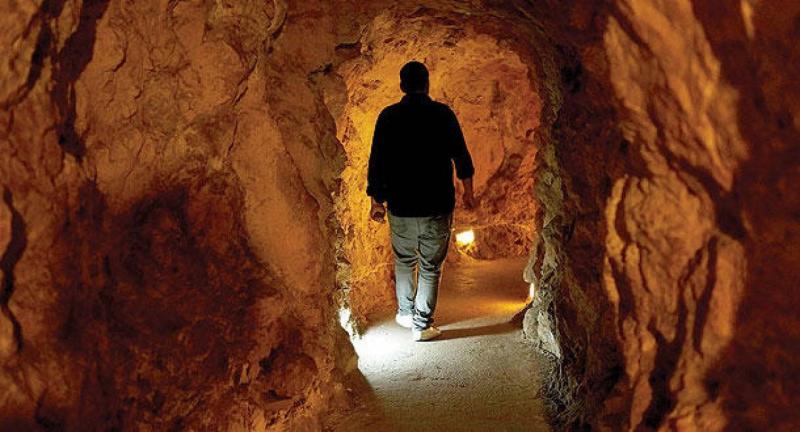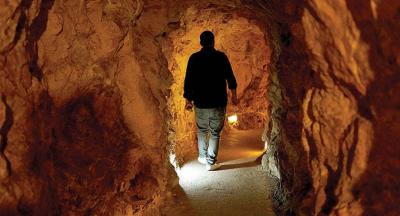Israel has renewed its fears concerning the network of tunnels possessed by Hezbollah in Southern Lebanon, viewing it as one of the group's most vital assets amid escalating threats of a large-scale war on the Lebanese-Israeli front. These concerns align with security reports, including one published by the French newspaper "Libération" on February 21, which revealed that "Lebanese Hezbollah has a more advanced secret tunnel network than that of Hamas in Gaza." The report stated that the group "has tunnels stretching hundreds of kilometers, with branches reaching Israel, and possibly further into Syria," with experts describing them as a potential "quagmire for the Israeli army if it decides to invade Southern Lebanon."
**Tunnels Networks**
Military and strategic expert Brigadier General Hassan Jouni views the tunnel networks possessed by Hezbollah, similar to those of Hamas, as part of a special strategy to confront Israeli attacks, as they provide a secure and protected means of transit. He confirms to "Asharq Al-Awsat" that "the tunnel networks have contributed to establishing a balance between underground and aerial combat against Israeli air superiority, making the fighting more vertical than horizontal." Jouni, who previously served as the commander of the Lebanese Army Command and Staff College, believes that "the tunnel strategy is one of Hezbollah's most important strengths, ensuring its freedom of maneuver underground," noting that "the extensive tunnel networks have been excavated in a way that integrates with military operations above ground, particularly in transferring fighters, weapons, and missiles to other points that could serve as shocking surprises on the battlefield."
**Regional Tunnel Network**
The "Alma" Research Center, which focuses on northern threats, indicated that "after the Second Lebanon War in 2006, Hezbollah, with the help of North Koreans and Iranians, initiated a project to form a regional tunnel network in Lebanon, which is larger than the 'Hamas Metro'." It considered that "Southern Lebanon is not Gaza, as it has a different type of terrain, including rocky hills and valleys, hence Israeli assessments cannot even entertain the idea that Hezbollah succeeded in digging tunnels up to 10 kilometers deep into Israeli territory, as such an achievement would require extraordinary efforts, given the solid rocky land and mountains, and succeeding in excavating them would be a 'military embarrassment,' not just an ordinary failure."
**Target Bank**
In every confrontation with Hezbollah, Israel identifies its target bank, alleging that these are military sites, rocket platforms, or weapons caches; however, it remains unable to possess a map of the tunnels or provide sufficient information about them. Military expert Hassan Jouni expresses his belief that the party "constructed its tunnels in a very advanced manner so that they became a crucial part of its defense system, especially since they were built under comfortable conditions and in a favorable geographical environment, unlike the Gaza Strip, which has been continuously besieged and monitored." He believes that the group "has benefited from extensive experiences in tunnel digging and is said to have utilized advanced digging methods, possibly sourced from North Korea, which will certainly enhance its ability to confront Israel as the tunnels contribute to developing guerrilla warfare operations." He does not rule out "the possibility of these tunnels being used for offensive operations, not just defensive ones, suggesting that they may extend into occupied Palestinian territories."
**Safe Transit Network**
In contrast to Hamas's military media, which launched a visual propaganda campaign about the importance of tunnels, Hezbollah has not followed this approach, despite the rising cadence of Israeli threats and the suggestion of a ground invasion of Southern Lebanon. This has reinforced the conviction among experts and observers that Israel does not possess adequate information about them and fears unexpected surprises. Dr. Riyad Kahwaji, director of the "Middle East and Gulf Military Analysis Foundation," states that "all information and data indicate that Hezbollah has a large tunnel network that allows it to move safely underground, given that Israel has significant air superiority, enabling it to monitor anything on the surface."
Kahwaji notes to "Asharq Al-Awsat": "The larger the tunnels and the capability for vehicles and cars to pass through, the more significant their role becomes; as we have seen in Gaza, how tunnels connect one area to another, with some used for weapons storage, others for weapon manufacturing, and some converted into rocket launch centers, Hezbollah has a larger and more complex network."
**Combat Tunnels**
Kahwaji, an expert on security and armaments, does not overlook the role the tunnels could play if Israel were to launch a ground invasion, mentioning "the existence of combat tunnels along the frontline of confrontation, most of which are used for tactical operations and ambushes, which will exacerbate the cost of human losses for the Israeli army." He adds: "It is true that Israel possesses tremendous military capabilities to launch a ground assault, but it certainly accounts for the high price it will pay, and the tunnels will undoubtedly be its greatest quagmire as Hezbollah will use them with great combat skill."




